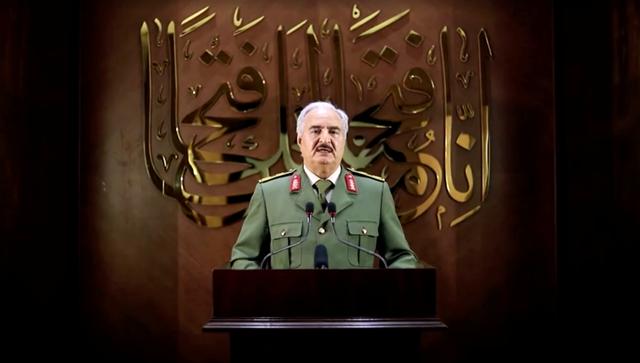
CAIRO (AP) — Eastern Libyan forces laying siege to the country’s capital of Tripoli said Wednesday they have agreed on a humanitarian pause in fighting during the Muslim holy month of Ramadan.
Ahmed al-Mosmari, a spokesman for the forces of military commander Khalifa Hifter, said at a news conference that they have stopped all military operations across Libya in response to international appeals for a humanitarian truce so authorities could focus on dealing with the coronavirus pandemic.
The recent round of fighting in war-torn Libya began last April when Hifter’s forces launched an offensive trying to take Tripoli, clashing with an array of militias loosely allied with the UN-supported but weak government in the capital.
There was no immediate comment from the Tripoli-based administration, known as the Government of National Accord.
Violence has escalated in recent weeks, with the two warring sides accusing each other of shelling civilian neighborhoods. The UN has said the violence and worsening humanitarian crisis in Libya could amount to war crimes.
The Tripoli-based government’s health ministry said shelling hit a medical facility in the capital Wednesday, killing at least one worker and wounding four others. Hifter’s forces also said a Turkish drone run by the Tripoli-allied militias targeted two ambulances in southwestern Libya.
Stephanie Williams, acting UN envoy in Libya, on Tuesday called for a humanitarian truce during Ramadan that could pave the way for a permanent cease-fire.
The cease-fire announcement came after Hifter, in an attempted show of strength, declared on Monday that a 2015 U.N.-brokered political deal to unite the oil-rich country was “a thing of the past.”
Al-Mosmari, the spokesman, said Wednesday that Hifer’s self-styled Libyan Arab Armed Forces would announce constitutional declaration including a “road map” that would lead the country to elections.
The Tripoli-based government had said it wasn’t surprised by Hifter’s announcement and urged Libyans to join “a comprehensive dialogue and continue on the democratic path to reach a comprehensive and permanent solution based on ballot boxes.”
While the 2015 agreement has failed to bring unity or stability to the divided country, Hifter’s announcement threatened to further complicate UN efforts to broker a political settlement to the civil war.
The clashes in Libyan have complicated efforts to fight the coronavirus outbreak. Libya has confirmed more than 60 cases, including two deaths, most of them in the country’s west.
The World Health Organization said Tuesday that fighting in the city of Tarhouna, south of Tripoli, and shelling close to the Mitiga airbase, which include the sole airport for the capital, along with severe water shortages in the capital, are “just some of the threats that impede our work to protect innocent people from COVID-19 and other health risks.”
Libya has been in turmoil since 2011, when a civil war toppled long-time dictator Moammar Gadhafi, who was later killed. The chaos has worsened in the recent round of fighting as foreign backers increasingly intervened despite pledges to the contrary at a high-profile peace summit in Berlin earlier this year.
___
Image: Libya’s eastern-based military leader Khalifa Haftar is seen in an unknown location in this screen grab taken from a video released on April 27, 2020. (LIBYAN NATIONAL ARMY HANDOUT/Reuters TV via REUTERS)




